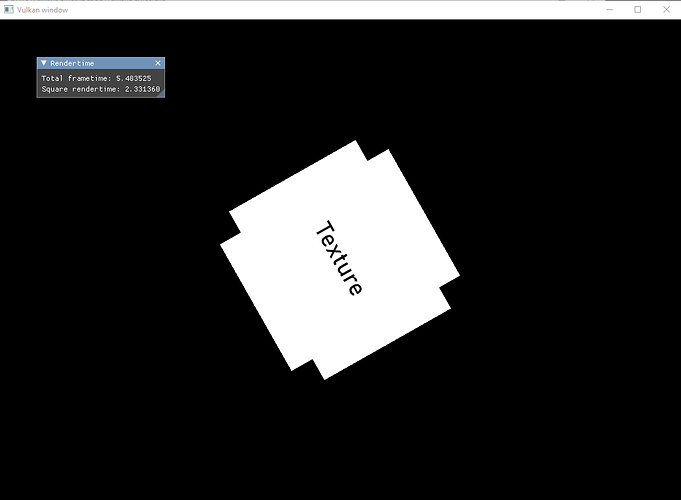Hello.
I am trying to measure the render time using timestamp queries.
I have this code:
if (vkBeginCommandBuffer(commandBuffers[imageIndex], &beginInfo) != VK_SUCCESS) {
throw MakeErrorInfo("Failed to begin recording command buffer!");
}
vkCmdResetQueryPool(commandBuffers[imageIndex], queryPools[imageIndex], 0, 2);
vkCmdWriteTimestamp(commandBuffers[imageIndex], VK_PIPELINE_STAGE_TOP_OF_PIPE_BIT, queryPools[imageIndex], 0);
vkCmdBeginRenderPass(commandBuffers[imageIndex], &renderPassInfo, VK_SUBPASS_CONTENTS_INLINE);
vkCmdBindPipeline(commandBuffers[imageIndex], VK_PIPELINE_BIND_POINT_GRAPHICS, graphicsPipeline);
VkBuffer vertexBuffers[] = { vertexBuffer };
VkDeviceSize offsets[] = { 0 };
vkCmdBindVertexBuffers(commandBuffers[imageIndex], 0, 1, vertexBuffers, offsets);
vkCmdBindIndexBuffer(commandBuffers[imageIndex], indexBuffer, 0, VK_INDEX_TYPE_UINT16);
vkCmdBindDescriptorSets(commandBuffers[imageIndex], VK_PIPELINE_BIND_POINT_GRAPHICS, pipelineLayout, 0, 1, &descriptorSets[imageIndex], 0, nullptr);
for (size_t i = 0; i < iterationsNumber; ++i) {
vkCmdDrawIndexed(commandBuffers[imageIndex], static_cast<uint32_t>(indices.size()), 1, 0, 0, 0);
}
vkCmdEndRenderPass(commandBuffers[imageIndex]);
vkCmdWriteTimestamp(commandBuffers[imageIndex], VK_PIPELINE_STAGE_BOTTOM_OF_PIPE_BIT, queryPools[imageIndex], 1);
if (vkEndCommandBuffer(commandBuffers[imageIndex]) != VK_SUCCESS) {
throw MakeErrorInfo("Failed to record command buffer!");
}
So, if iterationsNumber is equal to 1, then I get the following results:
Total frametime: 0.354 ms
Square command buffer rendertime: 0.016 ms
But if the iterationsNumber is 2000, then I get strange results:
Total frametime: 5.483 ms
Squares command buffers rendertime: 2.331 ms
Obviously, the imgui render time could not grow by itself, which means that the frame time is considered incorrect.
The only thing I do in my scene is render 2 command buffers, an imgui command buffer and a command buffer with squares.
I’ll leave my render function just in case:
Render code(It also shows how I take data from the query pool and count the time)
void MainWindow::drawFrame()
{
//Waiting for the fence to be ready(Waiting for the command buffer to finish executing for the frame)
vkWaitForFences(logicalDevice, 1, &inFlightFences[currentFrame], VK_TRUE, UINT64_MAX);
//Acquire image from swapchain
uint32_t imageIndex;
//UINT64_MAX disables timeout, timeout is infinite
VkResult result = vkAcquireNextImageKHR(logicalDevice, swapchain, UINT64_MAX, imageAvailableSemaphores[currentFrame], VK_NULL_HANDLE, &imageIndex);
if (result == VK_ERROR_OUT_OF_DATE_KHR) {
recreateSwapchain();
return;
}
else if (result != VK_SUCCESS && result != VK_SUBOPTIMAL_KHR) {
throw MakeErrorInfo("Failed to acquire swapchain image!");
}
// Check if a previous frame is using this image (i.e. there is its fence to wait on)
if (imagesInFlight[imageIndex] != VK_NULL_HANDLE) {
vkWaitForFences(logicalDevice, 1, &imagesInFlight[imageIndex], VK_TRUE, UINT64_MAX);
}
static std::vector<bool> isFirstTimeFrameRender(MAX_FRAMES_IN_FLIGHT, true);
if (isFirstTimeFrameRender[currentFrame] == false) {
uint64_t timestampsResults[2];
vkGetQueryPoolResults(logicalDevice, queryPools[imageIndex], 0, 2, sizeof(timestampsResults), timestampsResults, 0, VK_QUERY_RESULT_64_BIT);
//timestampsResults[0] is start point
////timestampsResults[1] is end point
VkPhysicalDeviceProperties deviceProperties;
vkGetPhysicalDeviceProperties(physicalDevice, &deviceProperties);
float nanosecondsInTimestamp = deviceProperties.limits.timestampPeriod;
float timestampValueInMilliseconds = ((timestampsResults[1] - timestampsResults[0]) * nanosecondsInTimestamp) / 1000000;
g_timestampValueInMilliseconds = timestampValueInMilliseconds;
}
else {
isFirstTimeFrameRender[currentFrame] = false;
}
// Mark the image as now being in use by this frame
imagesInFlight[imageIndex] = inFlightFences[currentFrame];
glfwGetWindowPos(window, &windowXPos, &windowYPos);
updateCommandBuffer(imageIndex);
imguiUpdateCommandBuffer(imageIndex);
updateUniformBuffer(imageIndex);
//Submitting the command buffer
//Each entry in the waitStages array corresponds to the semaphore with the same index in pWaitSemaphores.
VkSemaphore waitSemaphores[] = { imageAvailableSemaphores[currentFrame] };
std::vector<VkPipelineStageFlags> waitStages = { VK_PIPELINE_STAGE_COLOR_ATTACHMENT_OUTPUT_BIT };
VkSubmitInfo submitInfo{};
submitInfo.sType = VK_STRUCTURE_TYPE_SUBMIT_INFO;
//The first three parameters specify which semaphores to wait on before execution begins
//and in which stage(s) of the pipeline to wait.
//We want to wait with writing colors to the image until it's available, so we're specifying the stage of the graphics pipeline that writes to the color attachment.
submitInfo.waitSemaphoreCount = 1;
submitInfo.pWaitSemaphores = waitSemaphores;
submitInfo.pWaitDstStageMask = waitStages.data();
std::vector<VkCommandBuffer> currentCommandBuffers = { commandBuffers[imageIndex], imguiCommandBuffers[imageIndex] };
submitInfo.commandBufferCount = 2;
submitInfo.pCommandBuffers = currentCommandBuffers.data();
std::vector<VkSemaphore> signalSemaphores = { renderFinishedSemaphores[currentFrame], imguiRenderFinishedSemaphores[currentFrame] };
submitInfo.signalSemaphoreCount = 2;
submitInfo.pSignalSemaphores = signalSemaphores.data();
//Restore the fence to the unsignaled state
vkResetFences(logicalDevice, 1, &inFlightFences[currentFrame]);
//Start executing the command buffer
if (vkQueueSubmit(graphicsQueue, 1, &submitInfo, inFlightFences[currentFrame]) != VK_SUCCESS) {
throw MakeErrorInfo("Failed to submit draw command buffer!");
}
VkPresentInfoKHR presentInfo{};
presentInfo.sType = VK_STRUCTURE_TYPE_PRESENT_INFO_KHR;
presentInfo.waitSemaphoreCount = 2;
presentInfo.pWaitSemaphores = signalSemaphores.data();
VkSwapchainKHR swapchains[] = { swapchain };
presentInfo.swapchainCount = 1;
presentInfo.pSwapchains = swapchains;
presentInfo.pImageIndices = &imageIndex;
presentInfo.pResults = nullptr; // Optional
result = vkQueuePresentKHR(presentQueue, &presentInfo);
if (result == VK_ERROR_OUT_OF_DATE_KHR || result == VK_SUBOPTIMAL_KHR || framebufferResized) {
framebufferResized = false;
recreateSwapchain();
if (minimizedWindowNeedClose) {
return;
}
}
else if (result != VK_SUCCESS) {
throw MakeErrorInfo("Failed to present swapchain image!");
}
currentFrame = (currentFrame + 1) % MAX_FRAMES_IN_FLIGHT;
}
Why is this happening and how to fix it?
